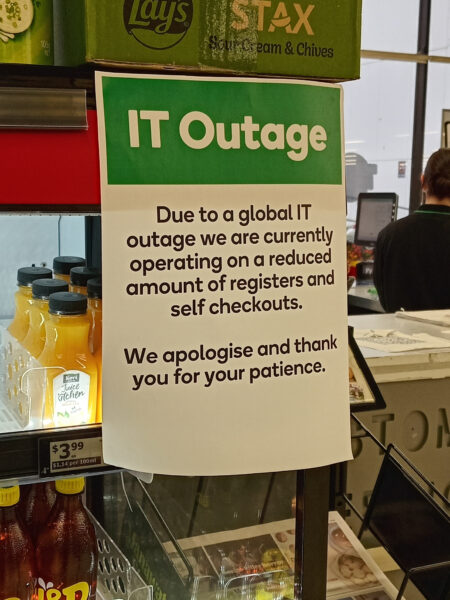Business Insider
Published Jul 13, 2019Oil paint is simple. At its most basic, it’s just a mixture of oil and pigment. But depending on the color and quality, a liter of this paint could cost you $285 to $1,100.
While the rise of oil paint is associated with the Renaissance, paintings using poppy-seed oil have been dated as far back as seventh-century Afghanistan. So what is it that makes this paint so special? And why is it so expensive?
(more…)
August 9, 2024
Why Oil Paint Is So Expensive | So Expensive
QotD: Celebrity fund-raising for foreign aid
Unlike private capital, foreign “aid” enters a country not because conditions there favor economic growth but because that country is poor — because that country lacks institutions and policies necessary for growth. And the more miserable its citizens’ lives, the more foreign “aid” its government receives.
Can you imagine a more perverse incentive? The poorer and more wretched are a nation’s people, the more likely celebrities such as Bono will convince Westerners and their governments to take pity on that country and to send large sums of money to its government. And because that country’s citizens are poor largely because their government is corrupt and tyrannical, the money paid in “aid” to that government will do nothing to help that country develop economically.
The cycle truly is vicious. Aid money naively paid by Westerners to alleviate Third-World poverty is stolen or misspent by the thugs who control the governments there. Nothing is done to foster the rule of law and private property rights that alone are the foundation for widespread prosperity. The people remain mired in ghastly poverty, their awful plight further attracting the attention and sympathy of Western celebrities, who use their star attraction and media savvy to shame politicians in the developed world into doling out yet more money to the thugs wielding power in the (pathetically misnamed) “developing world”.
If I could figure out a way to measure the long-term consequences of this new round of debt relief — a way that is so clear and objective that even the most biased party could not quibble with it — I would offer to bet a substantial sum of money that years from now this debt relief will be found to have done absolutely no good for the average citizens of the developing world.
It’s a bet I would surely — and sadly — win.
Don Boudreaux, “Faulty Band-Aid”, Pittsburgh Tribune-Review, 2005-06-18.
August 8, 2024
“The future was then” – the Avant-Garde is so passé
Ted Gioia shares some observations on the Avant-Garde in modern culture, where the bourgeoisie seem to have become immune — or at least inured — to all the épater-ie:
Some time back, I was invited to attend a concert by an up-and-coming avant-garde band. These musicians were hellbent on disruption and mayhem, proving their transgressive credentials at every turn.
My companion that evening was a well-known jazz musician and, at the end of the concert, he turned to me and said:
“The future was then.”
I laughed, because this was so true. The performance we had just experienced wanted to be cutting-edge and futuristic, but every note played reflected a notion of the avant-garde as it existed sixty years ago.
The future was then.
I thought of that concert recently when a magazine convened a group of artists and intellectuals and asked them a troubling question:
What happened to the avant-garde?
Few people paid attention to their hand-wringing. I didn’t even hear about this online colloquium until months had passed — and I try to stay on top of precisely these kinds of issues. Nobody I know mentioned it, and I stumbled upon it purely by chance.
But that only proves that there really is a crisis in the avant-garde. It’s a crisis of neglect. Of disinterest.
People once got worked up about cutting edge art and transgressive culture. They loved it or hated it, but they always had strong feelings. Nowadays they hardly notice.
Perhaps they are just deadened to it from over-exposure.
You can put up the strangest statue in the town square nowadays — let’s say Albert Einstein getting swallowed by a monster snail — and people just walk by it. They’ve seen it all before.
You have too.
Artists can make the most bizarre music, destroying instruments, shouting obscenities, and creating all sorts of noise. But — yawn! — somebody’s great-grandpa was doing all that three generations ago.
The Korean War Week 007 – The Pusan Perimeter – August 6, 1950
The Korean War by Indy Neidell
Published Aug 6, 2024The UN forces are withdrawn this week across the Naktong River into a new defensive zone in the Southeast corner of the Peninsula — the Pusan Perimeter, but already as the week begins they are in great danger from the right hook near the coast by the North Korean 6th Division, that threatens to upend everything, taking Chinju and aiming for Masan. There are also machinations afoot with the Chinese in Taiwan, and the fear that a larger war could erupt if things aren’t handled right concerning the Chinese; it’s a week full of tension.
(more…)
Panzer III: Versatile stalwart of the Panzer force
The Tank Museum
Published Apr 19, 2024See inside the Panzer III and discover the story of the most numerous German armoured fighting vehicle of World War II.
Intended as the German army’s main gun tank, with its brother, the Panzer IV, acting as support, the Panzer III fought in Europe and North Africa but was effectively obsolete by 1942 in the face of better opposition like the Soviet T-34. So the two changed places – an up-gunned Panzer IV becoming the gun tank with the Panzer III — now with a short barrelled 75mm gun — in the support role. This wouldn’t last long — but the Panzer III chassis would form the basis of the highly successful Stug III.
00:00 | Introduction
00:15 | Background
02:12 | Two Similar Designs
02:57 | Panzer III Designs
10:22 | Take a Look Inside
14:46 | An Interview with Mike Hayton
23:52 | What’s it like to Drive?
26:00 | ConclusionThis video features archive footage courtesy of British Pathé.
#tankmuseum #panzeriii
QotD: The real reason modern music sounds the same
… (paraphrasing Frank Zappa), back in the days rock was new enough that the record company execs had no idea how to handle it. They didn’t know what the kids would like, and they knew they didn’t know, so they used the plate of spaghetti approach — just throw it all at the wall and see what sticks.
Fast forward a few years, though, and now they’ve got a pretty good idea of what “rock” is. More importantly, they’ve got a pretty good handle on what the market for rock is. At that point, they do what execs in any industry do. Why bother trying to find the hot new thing, when you can just make it yourself?
And that’s why two guys you’ve never heard of, Max Martin and a dude calling himself “Dr. Luke”, have written every #1 pop hit for the last 15 years. I’m sure they don’t work cheap, but it’s a lot cheaper than scouting every bar band in America for a sound / look / stage act that might or might not pan out. Much easier to focus group a few traits, call up central casting, have them send over a made-to-order bimbo, and have him / her / xzhem front Dr. Luke’s latest computer-generated ditty.
And if everything on the radio all sounds exactly the same, that’s because it is exactly the same. Max Martin and Dr. Luke, and their zillion Mini-Mes at every level of the record biz, sometimes write songs for specific people — hey, guys, Katy Perry needs another ballad for her new album, hop to it! But mostly they write on spec, and shop it around. Different singers, different bands, different genres, doesn’t matter — this time it’s the two generic prettyboys in the “country” band Florida-Georgia Line singing it, but last time it was Katy Perry, the next time it’ll be the Backstreet Boys on their triumphant comeback tour, feat. Jay-Z and MC Funetik Spelyn. Same exact song, literally — it’s just that Kenny Chesney needed one more track on his album this time, and Taylor Swift didn’t, so now it’s #5 with a bullet on the “country” chart.
Severian, “Own Goals”, Rotten Chestnuts, 2021-07-21.
August 7, 2024
Unleashing the Atom: The Bombing of Hiroshima and Nagasaki – War Against Humanity 139
This video is only available on YouTube itself – click the image above or click here.
World War Two
Published 6 Aug 2024In August 1945, the United States became the first, and to this day only, nation ever to employ nuclear weapons in war. After The fledgling technology proves itself on the testing ground, it is ready for immediate use. The price for this innovation is paid by hundreds of thousands of Japanese civilians who are blinded, burned, crushed, irradiated, and finally burned in a humanitarian crisis never seen before and never since. Join us to hear the gut-wrenching accounts of survivors and understand the motivations behind this tragic outcome to ensure that the horrors of nuclear war are never forgotten and never again unleashed upon the world and its people.
Maxims in the Skies: the German LMG 08/15
Forgotten Weapons
Published Apr 24, 2024As soon as the MG08/15 “light” machine gun was adopted by Germany, it was recognized as an ideal basis for an aircraft gun. Weight was of the essence for WW1 aircraft, and a lightened Maxim was just the thing to use. So the Spandau Arsenal began producing the LMG08/15 (the “L” in which might stand for either air-cooled or lightweight; we really don’t know which) in May 1916. In addition to cutting a ton of lightening slots in the water jacket, the guns also had mechanisms added to allow a pilot to cycle both the bolt and the feed system from behind the gun (something not possible with a standard ground model). The example we are looking at today has a great example of an early style of such device completely intact …
(more…)
QotD: The crew of HMS Sheffield in the Falklands
But it’s 40 years since the Falklands. And from that we get this:
May 4th 1982: As HMS Sheffield is abandoned and the fire spreads towards the Sea Dart ammunition. The remaining crew gather on the foredeck singing “Always look on the bright side of life”.
Now I have heard that story and I’ve always thought it were more than a little bit mythmaking. And yet, and yet. Someone I know (our fathers knew each other, he took a sister out a few times, we worked together for 6 months later on) was actually there. Running the flight control stuff from the next ship over:
Singing led by the FC that we had loaned to them. One of our Sea Kings closed on the fo’c’sle to pick up wounded and saw them all swaying from side to side with their arms outstretched. I learned why when he got back.
I’ll take that as being something that really happened then. Not for publication, not something published for home consumption, but something that actually happened. Young men, on a burning ship, not knowing whether they’d be lifted off before the fire got to the missiles and the kaboom of their little bits all over the South Atlantic. […]
We’re a weird, weird culture here in Britain. We will, and do, take the piss out of absolutely anything, including our own impending death.
Now, whether that’s quite what the economists mean by institutions that aid in economic development is another thing but it is indeed one of those institutions of that British culture.
It’s also wholly glorious but then I’m a Brit so I would say that, wouldn’t I?
Tim Worstall, “The British Are A Very, Very, Weird People”, It’s all obvious or trivial except …, 2024-05-06.
August 6, 2024
Britain’s immigration debate turns violent
At The Last Ditch, Tom discusses how the immigration issue has become the issue in modern Britain:
Margaret Thatcher famously quoted Kipling’s Norman and Saxon to President Mitterand of France in an EU meeting;
The Saxon is not like us Normans. His manners are not so polite.
But he never means anything serious till he talks about justice and right.
When he stands like an ox in the furrow – with his sullen set eyes on your own,
And grumbles, “This isn’t fair dealing”, my son, leave the Saxon alone.She was trying, perhaps not as delicately as her diplomats would have wished, to explain how the apparently calm British will react – eventually – to being wronged.
I spent twenty years in three other countries and worked closely in business with people from many more. I have often smiled to myself since returning when I hear British people speak of our unique sense of fair play. It’s not unique at all. Everyone has it. We do not own fairness. We do not own tolerance.
We do, however, traditionally pride ourselves on both and the way we see ourselves has shaped our reactions over the last twenty-five years as we welcomed more immigrants than in the previous two millennia. A few years ago I listened quietly to a Bangladeshi friend – a would-be human rights lawyer – talk about racism in our country. I asked her where in the world was a better place to live as a member of an ethnic minority. On reflection, she agreed with me that there is nowhere.
I am not saying we couldn’t treat each other better. Of course we could and should try. But let’s take a moment, as our streets burn and our elites condemn us as far-right racists, to be proud of how we’ve behaved in general towards so many new arrivals in such a short time.
[…]
One day history may reveal which politician in the capital of an old European empire realised there was a ready supply of workers in the former colonies. People who spoke our languages and were familiar with our systems of government – because both had been forced on their ancestors. It was a perilous idea that may yet prove to be the end of European civilisation but he must have looked like a genius to his peers.
The doors were opened and cheap labour flooded in. From the lofty heights where the elites survey us, it looked like a perfect solution. On the ground, not always so much. Mostly we’ve been welcoming, accepting and tolerant. We’ve sometimes even gone beyond tolerance and flattered our new arrivals that they’ve enhanced our magnificent old culture with their jerk chicken and curries.
Yet already when I was a youngster practising criminal law problems had begun to emerge. A custody sergeant with whom I used to chat when waiting to see clients in the cells told me suicide rates among Muslim girls in our Midlands city were disturbingly high. Asked why that was, he said they were not suicides, but honour killings – the first time I’d heard that phrase. No-one, he said, commits suicide by pouring paraffin over themselves and setting themselves alight. It’s just too painful. Muslim men were killing their daughters and sisters. Asked why there were no prosecutions, he said senior police officers made it clear to their subordinates that it was “racist” to suggest the dead girls’ families’ stories of suicide were untrue.
Fresh out of my university law faculty, I sneered that his bosses were right and he was a racist. I will never forget the last words he said to me;
Young man, then you’re part of the problem.
And I was. In that moment, I’d turned away from murdered women to preserve my smug world view. Just as, decades later, council staff and police officers in cities all over Britain turned away from young girls groomed and raped by Muslim men, for fear of being called bad names.
Gary Fouse in the New English Review asks whatever happened to Merry Olde England:
If you have been following the news out of England for the past week, you might think that the country has all but fallen into civil war. Riots and various forms of violent protests and counterprotests have broken out in cities all over the country in reaction to a shocking murder that occurred in the town of Southport last week. On July 29, a group of little schoolgirls were attending some sort of Taylor Swift-themed dancing class when a 17-year-old son of Rwandan immigrants (who was born in England) attacked them with a knife. Three of the schoolgirls (ages 6. 7, and 9) have died and eight others went to the hospital with serious knife wounds.
The entire nation has erupted in shock and anger. Obviously, the anger is being directed at immigrants in general — given the country’s out of control migration situation and long-simmering tensions with the largely-radicalized Muslim communities. It seems that now-finally — the people have had enough. At least one migrant shelter has been attacked, and several Muslim young men are showing up to counter-protest and do battle with young white men. Now the cops in several cities are trying to keep the two sides apart.
I should state at this point that I will not condone the violence and destruction that is taking place and the objects being thrown at police who are trying to keep order. While I do not condone the violence, I think I can understand why it is taking place. I recall back in the 1960s when there were many riots in inner city areas of the US during the Civil Rights era and in response to the murders of black civil rights leaders like Martin Luther King and Medgar Evers. Many responsible black leaders condemned the violence but also added that they could understand the reasons for it. It was a different era then in America, and in the South, segregation had the force of local laws behind it. Many blacks felt that the government was not responding to their grievances.
[…]
The fact is that far too many nations in the West, including ours, have suffered from bad political leadership. We see it in our cities, we see it in our state capitals, and we see it in Washington DC. Bad political leadership results in bad cities, bad states, and a bad country. The fish rots from the head, and what we need to do-in England-in France, in America, etc is elect responsible people who recognize that their government’s number one duty is to protect the citizens. When a government fails to do so, eventually what happens is what we see in England today.
The CrowdStrike outage and regulatory capture
Peter Jacobsen discusses the July technical and financial fiasco as a faulty software patch from CrowdStrike took down huge segments of the online economy and how regulatory capture may explain why the outage was so widespread:
On July 19th, something peculiar struck workers and consumers around the world. A global computer outage brought many industries to a sudden halt. Employees at airports, financial institutions, and other businesses showed up to work only to find that they had no access to company systems. The fallout of the outage was huge. Experts estimate that it totaled businesses $5 billion in direct costs.
The company responsible, CrowdStrike, was also severely impacted. Shareholders lost about $25 billion in value, and some are suing the company. The outage has led to expectations of, and calls for, stricter regulations in the industry.
But how did the blunder of one company lead to such a massive outage? It turns out that the supposed solution of “regulation” may have been one of the primary culprits.
Regulatory Compliance
CrowdStrike, ironically, is a cybersecurity firm. In theory, they protect business networks and provide “cloud security” for online cloud computing systems.
Cloud security, in and of itself, is likely a service that businesses would demand on the market, but the benefit of increased security isn’t the only reason that businesses go to CrowdStrike. On their own website, the company boasts about one of its most important features: regulatory compliance.
[…]
When experts who have relationships with companies are called in to help write regulations, they may do so in a way favorable to industry insiders rather than outsiders. Thus, regulation is “captured” by the subjects of regulation.
We can’t say with certainty that this particular outage is the result of an intentional regulatory capture by CrowdStrike, but it seems clear that CrowdStrike’s dominance is, at least in part, a result of the regulatory environment, and, like most large tech companies, they’re not afraid to spend money lobbying.
In any case, without cumbersome regulations, it’s unlikely that cybersecurity would take on such a centralized form. Despite this, as is often the case, issues caused by regulation often lead to more calls for regulation. As economist Ludwig von Mises pointed out:
Popular opinion ascribes all these evils to the capitalistic system. As a remedy for the undesirable effects of interventionism they ask for still more interventionism. They blame capitalism for the effects of the actions of governments which pursue an anti-capitalistic policy.
So despite the reflexive call for regulation that happens after any disaster, perhaps the best way to avoid problems like this would be to argue that in terms of regulation, less is more.
Me262 – Why It Was Rubbish
HardThrasher
Published Feb 16, 2024A brief and sober discussion of the multi-faceted nature of aircraft development in the 3rd Reich, and an assessment of the aircraft itself in context of the political and organisational challenges and changes from 1939-1945. Or to put it another way, why it was rubbish from start to finish.
Timestamps
00:00 – 00:22 – Trailer
00:22 – 01:49 – Introduction
01:49 – 05:14 – Willy Messerschmitt’s World Falls Apart
05:18 – 08:03 – Udet’s Flying Circus
08:07 – 11:26 – Me262’s Development
11:26 – 11:32 – Popcorn
11:33 – 13:37 – The Me163 Affair
13:42 – 19:30 – Milch Tries to Break His Willy
19:33 – 30:18 – Hitler’s Big Brain Moment
30:21 – 42:03 – Speeds and Feed of the Me262
42:05 – 46:53 – Operational History
46:54 – 48:50 – Survivor’s Club
(more…)
QotD: Malicious idiocy
God made not men to be malicious idiots. This is something we achieved entirely on our own. It is a living testament to Free Will; and those who attribute malice to the Devil may be too humble. We study his suggestions and run with them. True, he may have started it in scrimmage, but only a human can take it, as we say, “the full nine yards.”
Perhaps we should make it an Olympic event, with male, female, and trans competitions. It would be more fair than the other competitions for running, jumping, lifting weights, &c. No single country would dominate the sport, at least to begin with; some of the smallest nations could excel. Or if they didn’t, malicious idiots could charge the field, accusing judges and timekeepers of racism and hate crimes, adding to the loathely spectacle: Citius! Altius! Fortius!
David Warren, “Off & running”, Essays in Idleness, 2019-11-22.
[NR: This QotD has become much more timely than it was when I scheduled it for today a few months ago.]












